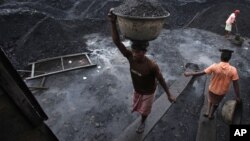NEW DELHI — In India, opposition members are calling for the prime minister's resignation following the latest allegations of corruption to hit the ruling coalition. Lawmakers have refused to take up any legislation, as parliament was adjourned for a third day.
Minutes after parliament convened Thursday, Bharatiya Janata Party lawmakers crowded aisles and shouted slogans demanding Prime Minister Manmohan Singh step down.
The opposition has been making the demand since Tuesday, days after the national auditor released a report saying the government sold coal fields to private companies between 2004 and 2009 without transparency and competitive bidding. The auditor estimated that private companies made profits of more than $34 billion, money that could have been "accrued to the national exchequer."
The report exonerates Singh, but the Bharatiya Janata Party (BJP) says the prime minister must be held responsible for the alleged losses because he was in charge of the coal ministry during the time the licenses were allotted.
The government has turned down demands for the prime minister's resignation, and offered to debate the report.
India's law minister, Salman Khurshid, accuses the BJP of holding parliament for ransom. "Why do they have ear plugs?" asked Khurshid. "I do not know, simply because they are not willing to listen to the truth."
The scandal over coal mining is the latest to hit India, where Prime Minister Singh has been widely accused of not being serious about controlling graft. A series of multi-billion dollar scams have come to light in the last two years relating to the hosting of the 2010 Commonwealth Games and the sale of mobile phone licenses.
As both the Congress Party and the BJP lock horns over the latest corruption scandal, concerns are mounting that the parliamentary deadlock will delay the passage of crucial reform legislation at a time when the economy is slowing.
The head of the New Delhi policy institute PRS Legislative Research, C.V. Madhukar, says there are more than 100 bills to be passed by parliament. These include landmark legislation relating to land acquisition and judicial reforms.
"There are many crucial bills which are pending in parliament, these are all important, far-reaching bills that have a huge impact on the economy and on people," noted Madhukar. "All of these bills are very, very important and they are all stalled. While the issues that are being raised may be legitimate, stalling legislation has huge national consequences for all of us."
Opposition parties have often disrupted parliament in hopes of putting pressure on the government. But the tactic has been used much more frequently in the last two years.
Minutes after parliament convened Thursday, Bharatiya Janata Party lawmakers crowded aisles and shouted slogans demanding Prime Minister Manmohan Singh step down.
The opposition has been making the demand since Tuesday, days after the national auditor released a report saying the government sold coal fields to private companies between 2004 and 2009 without transparency and competitive bidding. The auditor estimated that private companies made profits of more than $34 billion, money that could have been "accrued to the national exchequer."
The report exonerates Singh, but the Bharatiya Janata Party (BJP) says the prime minister must be held responsible for the alleged losses because he was in charge of the coal ministry during the time the licenses were allotted.
The government has turned down demands for the prime minister's resignation, and offered to debate the report.
India's law minister, Salman Khurshid, accuses the BJP of holding parliament for ransom. "Why do they have ear plugs?" asked Khurshid. "I do not know, simply because they are not willing to listen to the truth."
The scandal over coal mining is the latest to hit India, where Prime Minister Singh has been widely accused of not being serious about controlling graft. A series of multi-billion dollar scams have come to light in the last two years relating to the hosting of the 2010 Commonwealth Games and the sale of mobile phone licenses.
As both the Congress Party and the BJP lock horns over the latest corruption scandal, concerns are mounting that the parliamentary deadlock will delay the passage of crucial reform legislation at a time when the economy is slowing.
The head of the New Delhi policy institute PRS Legislative Research, C.V. Madhukar, says there are more than 100 bills to be passed by parliament. These include landmark legislation relating to land acquisition and judicial reforms.
"There are many crucial bills which are pending in parliament, these are all important, far-reaching bills that have a huge impact on the economy and on people," noted Madhukar. "All of these bills are very, very important and they are all stalled. While the issues that are being raised may be legitimate, stalling legislation has huge national consequences for all of us."
Opposition parties have often disrupted parliament in hopes of putting pressure on the government. But the tactic has been used much more frequently in the last two years.





